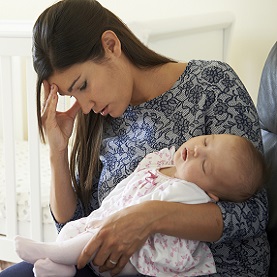Postpartum Depression (PPD) can affect any woman—women with easy pregnancies or problematic pregnancies, first-time mothers and mothers with one or more children, women who are married and women who are not. PPD affects all mothers regardless of income, age, race or ethnicity, culture or education. It is an uphill battle, but it can be won.
Moms, you are not alone. It is not your fault and it’s important to know that you have done nothing wrong. According to the American Psychological Association, PPD affects 1 in 7 mothers. PPD reveals itself in many ways. It can appear days or even months after delivering a baby; and can last for many weeks or months if left untreated.
Postpartum depression results from changes in a new mother’s hormone levels and/or other risk factors. It can affect your ability to take care of you of your children or yourself. You are more likely to experience PPD if you have a family history of depression, a previous diagnosis of PPD, major depression, and/or any other mood disorders in the past. Stressful life events during or after your pregnancy can make you susceptible as well.
How do I know I have PPD?
According to the American Psychological Association, warning signs are different for everyone but may present themselves as:
– Inability to sleep, sleeping too much, difficulty falling or staying asleep
– Disinterest in the baby, family, and friends
– Difficulty concentrating, remembering details, or making decisions
– Thoughts of hurting yourself or the baby
– A loss of pleasure or interest in things you used to enjoy, including sex
– Eating much more, or much less, than you usually do
– Anxiety—all or most of the time—or panic attacks
– Racing, scary thoughts
– Feeling guilty or worthless—blaming yourself
– Excessive irritability, anger or agitation—mood swings
– Sadness, crying uncontrollably for very long periods of time
– Fear of not being a good mother
– Fear of being left alone with the baby
– Misery
– Thoughts of suicide
Listen as these mothers tell Buzzfeed when they knew it was time to seek help.
If you recognize any of these symptoms, reach out to a trusted family member or your primary physician. If left untreated the bond between you and your child can be at extreme risk. The limited attachment a child receives from his/her mother can lead to behavioral and cognitive delays in the child.
What can I do?
– Don’t face PPD alone—Seek help from a psychologist or other licensed mental health provider; contact your doctor or other primary health care provider.
– Talk openly about your feelings with your partner, other mothers, friends, and relatives.
– Join a support group for mothers—ask your health care provider for suggestions if you can’t find one.
– Find a relative or close friend who can help you take care of the baby.
– Get as much sleep or rest as you can even if you have to ask for more help with the baby if you can’t rest even when you want to, tell your primary health care provider.
– As soon as your doctor or other primary health care provider says it’s okay, take walks, get exercise.
– Try not to worry about unimportant tasks—be realistic about what you can really do while taking care of a new baby.
– Cut down on less important responsibilities.
We understand that not all mothers have the financial or economic freedom, to take time off of work or parenting. The lack of time for yourself and added pressure can extenuate your depression. Talk to someone. Early detection and treatment make all the difference. Resources are available to you.
PPDMoms
1-800-PPDMOMS (1-800-773-6667)
Antelope Valley Health Partners
Lancaster, CA (661) 942-4719
Northridge Hospital Medical Center
Northridge, CA (818) 885-3575
Hesperia Health Center
Hesperia, CA (800) 722-4777
San Bernardino Health Center
San Bernardino, CA (800) 722-4777
Mental illness kills more mothers in the first year postpartum than anything else and is a major contributor to marriage/relationship breakdown after a baby. Mom, Camille Mehta, has made it her mission to end the isolation and shame that so many new parents face. Listen as she shares some great tips and advice on how to continue parenting through postpartum depression.


